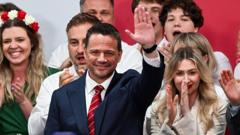The exit poll, with a margin of error of 3%, indicates Trzaskowski, the liberal Mayor of Warsaw, winning with 50.3%, compared to Nawrocki's 49.7%. Both candidates opted for contrasting narratives following the results, marking a potentially transformative moment in Polish politics.
Trzaskowski, declaring victory in front of supporters, acknowledged the narrow margin, stating, “We won,” while alluding to the phrase “razor's edge” becoming part of Polish political lexicon. He extended a promise to reach out to voters from all sides, asserting his intent to be a president for every Polish citizen.
Conversely, Nawrocki, a conservative historian supported by the Law and Justice party (PiS), emphasized that the election's result is too close to definitively claim victory, urging his supporters to keep hope alive. The current president, Andrzej Duda, has been a stalwart of the conservative field, often clashing with the government’s agenda under Prime Minister Donald Tusk.
The significance of the election is underscored by the president's ceremonial role, with limited authority but the potential to override legislative proposals—a power wielded by Duda against Tusk's pro-European Union policies. The confirmation of Trzaskowski's victory could bolster Tusk's initiatives toward European integration by diminishing the presidential veto challenge.
However, if Nawrocki emerges victorious, he would reinvigorate PiS and its confrontational stance, hinting at future conflicts between the presidency and the government. Despite differing views on EU relations—with Trzaskowski favoring integration and Nawrocki advocating for a sovereign Poland—both candidates at least agree on providing support to Ukraine amid its crisis with Russia.
With various allegations affecting both candidates during the campaign, controversy looms large. Trzaskowski faced criticism for appearing disconnected from ordinary citizens, while Nawrocki navigated claims of past misconduct, including accusations of leveraging personal connections for advantage.
As Poland's political landscape hangs in the balance, citizens and observers alike await the official results, expected to be released on Monday morning, which will clarify the path forward for the country's governance and its position in Europe.
Trzaskowski, declaring victory in front of supporters, acknowledged the narrow margin, stating, “We won,” while alluding to the phrase “razor's edge” becoming part of Polish political lexicon. He extended a promise to reach out to voters from all sides, asserting his intent to be a president for every Polish citizen.
Conversely, Nawrocki, a conservative historian supported by the Law and Justice party (PiS), emphasized that the election's result is too close to definitively claim victory, urging his supporters to keep hope alive. The current president, Andrzej Duda, has been a stalwart of the conservative field, often clashing with the government’s agenda under Prime Minister Donald Tusk.
The significance of the election is underscored by the president's ceremonial role, with limited authority but the potential to override legislative proposals—a power wielded by Duda against Tusk's pro-European Union policies. The confirmation of Trzaskowski's victory could bolster Tusk's initiatives toward European integration by diminishing the presidential veto challenge.
However, if Nawrocki emerges victorious, he would reinvigorate PiS and its confrontational stance, hinting at future conflicts between the presidency and the government. Despite differing views on EU relations—with Trzaskowski favoring integration and Nawrocki advocating for a sovereign Poland—both candidates at least agree on providing support to Ukraine amid its crisis with Russia.
With various allegations affecting both candidates during the campaign, controversy looms large. Trzaskowski faced criticism for appearing disconnected from ordinary citizens, while Nawrocki navigated claims of past misconduct, including accusations of leveraging personal connections for advantage.
As Poland's political landscape hangs in the balance, citizens and observers alike await the official results, expected to be released on Monday morning, which will clarify the path forward for the country's governance and its position in Europe.

















